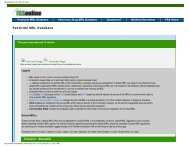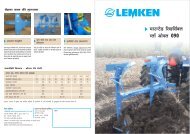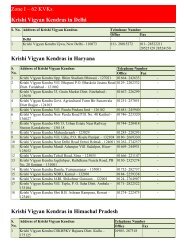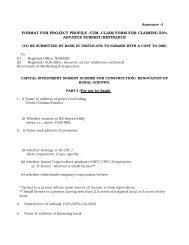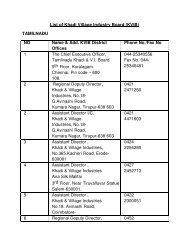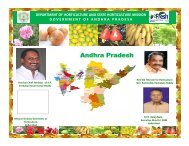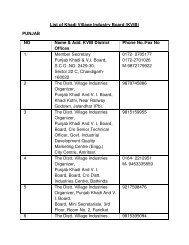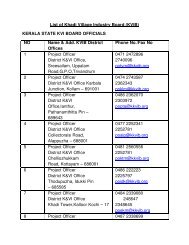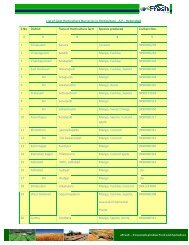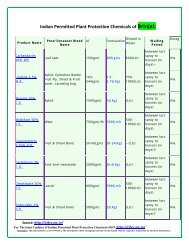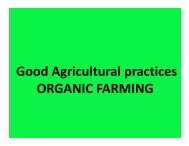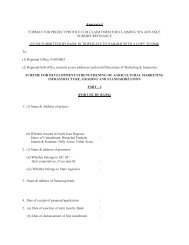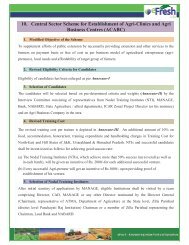Schemes of Coconut Development Board - Efresh India
Schemes of Coconut Development Board - Efresh India
Schemes of Coconut Development Board - Efresh India
Create successful ePaper yourself
Turn your PDF publications into a flip-book with our unique Google optimized e-Paper software.
<strong>Schemes</strong> <strong>of</strong> <strong>Coconut</strong> <strong>Development</strong> <strong>Board</strong><br />
<strong>Coconut</strong> <strong>Development</strong> <strong>Board</strong><br />
(CDB) is a statutory body<br />
established under the Ministry <strong>of</strong><br />
Agriculture, Government <strong>of</strong> <strong>India</strong> for the integrated development <strong>of</strong> coconut cultivation and<br />
industry in the country with focus on productivity increase and product diversification.<br />
Production & Distribution <strong>of</strong> Planting Material<br />
Expansion <strong>of</strong> Area under <strong>Coconut</strong><br />
Integrated Farming for Productivity Improvement<br />
Technology Demonstration<br />
Market Promotion & Statistics<br />
<strong>Coconut</strong> Palm Insurance Scheme<br />
Information and Information Technology<br />
Human Resource <strong>Development</strong><br />
Financial assistance under Technology Mission<br />
Replanting and Rejuvenation <strong>of</strong> <strong>Coconut</strong> Gardens in Traditional States in <strong>India</strong><br />
1. Production & Distribution <strong>of</strong> Planting Material<br />
The objective <strong>of</strong> the program is to enhance the production and supply <strong>of</strong> good quality<br />
planting materials through following component programs.<br />
Establishment <strong>of</strong> Demonstration cum Seed Production (DSP) Farms in different parts <strong>of</strong> the<br />
country covering total area <strong>of</strong> 240 ha with the aim to produce quality seed nuts.<br />
Setting up <strong>of</strong> coconut nurseries that are attached to the DSP farms to produce quality<br />
seedlings <strong>of</strong> desired cultivars / varieties suitable for each locality<br />
Aid to registered/ private/ approved coconut nurseries<br />
Financial assistance is limited to 25% <strong>of</strong> the cost <strong>of</strong> production or Rs.2 lakhs whichever is<br />
less. The minimum financial assistance <strong>of</strong> Rs.50000 is allotted for producing 6250<br />
seedlings annually from 25 cents and maximum financial assistance <strong>of</strong> Rs.2 lakhs for<br />
producing 25000 seedlings edlings from one acre.<br />
Establishment <strong>of</strong> Regional coconut nursery for supplementing the nursery programs <strong>of</strong> the<br />
state government. The maximum financial assistance for setting up <strong>of</strong> regional coconut<br />
nursery in nontraditional areas is 50% <strong>of</strong> cost <strong>of</strong> production.<br />
Aid to establish nuclear seed garden in private sector / registered / cooperative societies/<br />
farmers' associations. Maximum financial assistance is limited to Rs.6 lakhs to establish
seed garden phased over a period <strong>of</strong> 3 years @ Rs.3 lakhs during the 1st year and Rs.1.50<br />
lakhs each in second and third year respectively. The quantum <strong>of</strong> financial assistance is<br />
based on the total area <strong>of</strong> seed garden (maximum 4 ha) or limited to 25% <strong>of</strong> the cost <strong>of</strong><br />
establishment <strong>of</strong> nuclear seed garden.<br />
2. Expansion <strong>of</strong> Area under <strong>Coconut</strong><br />
This program is intended to bring in more area under coconut in the potential belts<br />
thereby increasing the production potential in the country. For this, the small and<br />
marginal farmers are given incentive assistance for undertaking new planting <strong>of</strong><br />
coconut and its further maintenance. The new planting assistance is given at the<br />
rate <strong>of</strong> Rs. 8,000 per hectare, , which is disbursed in two equal annual installments.<br />
The program is implemented by the <strong>Board</strong> through the Department <strong>of</strong> Agriculture/<br />
Horticulture <strong>of</strong> various States/ UT's as the cases may be. Application forms prescribed<br />
by the <strong>Board</strong> are supplied to various implementing <strong>of</strong>fices <strong>of</strong> the State Government<br />
which in turn are distributed to the eligible farmers. The filled in applications submitted<br />
by farmers after proper field verification are forwarded to the <strong>of</strong>fice <strong>of</strong> the <strong>Board</strong><br />
concerned with proper recommendation <strong>of</strong> the implementing <strong>of</strong>ficers for further<br />
processing and sanction <strong>of</strong> subsidy. The <strong>Board</strong> after scrutiny <strong>of</strong> the applications,<br />
sanctions eligible subsidy and disburse the sum in the form <strong>of</strong> individual cheques/<br />
demand drafts to the farmers through the same implementing <strong>of</strong>fices.<br />
3. Integrated Farming for Productivity Improvement<br />
The objective <strong>of</strong> the program is to improve production and productivity <strong>of</strong> the coconut<br />
holdings through an integrated approach and thereby increasing the net income from<br />
unit holdings with the following component program<br />
Lying out <strong>of</strong> demonstration plots<br />
Financial assistance <strong>of</strong> Rs.35, 000 per ha in two annual installments is provided for<br />
adoption <strong>of</strong> integrated management practices in disease affected gardens. The<br />
objective <strong>of</strong> the program is to encourage the farmers to adopt the technology<br />
developed for the management <strong>of</strong> disease affected coconut gardens. Demonstrations<br />
plots will also help in motivate farmers in adoption <strong>of</strong> result oriented production<br />
technologies.<br />
Integrated Farming for Productivity Improvement on CLUSTER basis: The<br />
objective <strong>of</strong> the <strong>Coconut</strong> Clusters is increasing the production and productivity <strong>of</strong><br />
coconut from unit holdings by proper and timely adoption <strong>of</strong> package <strong>of</strong> practices in a<br />
farmer participatory mode. This program will facilitate the adoption <strong>of</strong> appropriate<br />
coconut based farming systems and promote farm level processing for value addition<br />
on a community basis. The scheme is being implemented by the <strong>Board</strong> on cluster<br />
basis in a contiguous area <strong>of</strong> appropriate size <strong>of</strong> 25-5050 ha irrespective <strong>of</strong> the individual<br />
size <strong>of</strong> the holdings. The selection <strong>of</strong> the cluster is based on criteria such as<br />
demonstration value, easy accessibility, and availability <strong>of</strong> minimum infrastructure<br />
facilities for the adoption <strong>of</strong> average management practices, cohesiveness <strong>of</strong> the<br />
group and most importantly the readiness <strong>of</strong> the farmers in the cluster to assume<br />
responsibility and implement the program in a farmer participatory mode as per the<br />
<strong>Board</strong>'s guidelines.
Assistance for organic manure units<br />
To promote the use <strong>of</strong> organic manure like vermin - compost, coir pith compost,<br />
ordinary compost and FYM in coconut holdings. Financial assistance <strong>of</strong> Rs.20000 per<br />
unit or 50% <strong>of</strong> cost <strong>of</strong> production is provided for setting up <strong>of</strong> a unit.<br />
4. Technology Demonstration<br />
Maintenance <strong>of</strong> Pilot Testing Plant and Quality Control laboratories<br />
Techno-economic economic studies on product diversification and byproduct<br />
utilization.<br />
Consultancy service on production, processing and marketing<br />
Training program on convenience foods<br />
5. Market Promotion & Statistics<br />
Market information and intelligence service<br />
Modernization <strong>of</strong> coconut processing by introduction <strong>of</strong> improved copra dryer /<br />
other processing machineries / equipment @ 25% <strong>of</strong> the cost <strong>of</strong> dryer /<br />
equipment or maximum Rs.10,000, whichever is less.<br />
Surveys and evaluation studies<br />
6. <strong>Coconut</strong> Palm Insurance Scheme<br />
i) Introduction: <strong>Coconut</strong> cultivation subjected to risks from climatic changes, natural<br />
disasters, pests, diseases etc. And at times, entire coconut cultivation <strong>of</strong> a region<br />
gets wiped out due to natural calamity or onset <strong>of</strong> pest attack. <strong>Coconut</strong> is a perennial<br />
crop and losses suffered by farmers due to damage <strong>of</strong> this crop, are material and<br />
needs to be addressed. At present, there is no insurance scheme under which<br />
coconut cultivation may be covered, since National Agricultural Insurance Scheme<br />
(NAIS) for insurance <strong>of</strong> cereals, eals, millets, pulses, oilseeds and horticultural crops.<br />
ii) Eligibility criteria: As per the Scheme, individual farmer / grower <strong>of</strong>fering at least 10<br />
healthy but bearing palms for insurance in specified age group, (4-60 years for dwarf,<br />
hybrid and 7-60 years for tall) in contiguous area / plot will be eligible for insurance.<br />
iii) Premium Subsidy: Of amount under para 9 above, 50% will be paid by <strong>Coconut</strong><br />
<strong>Development</strong> <strong>Board</strong> (CDB) and 25% by State Government concerned and balance<br />
25% will be paid by farmer / grower. In case, the State Government does not agrees<br />
to bear 25% share <strong>of</strong> premium, farmers / growers will be required to pay 50% <strong>of</strong><br />
premium, if interested in insurance scheme. Premium subsidy amount (50% by CDB<br />
and 25% by participating States) will be released to AIC in advance based on<br />
estimates, which will be replenished / adjusted on quarter / year basis.
7. Information and Information Technology<br />
Production <strong>of</strong> publications in different languages including grant-in-aid to State<br />
Government / Universities for production <strong>of</strong> publications<br />
Production and screening <strong>of</strong> films including grant-in-aid to State<br />
Govt./Universities for production <strong>of</strong> films<br />
Participation in exhibitions and fairs<br />
Conducting seminars and workshops<br />
Awards to best growers, master craftsmen, industrialists, sts, processors and<br />
exporters<br />
Training youths in harvesting and plant protection<br />
Training farmers in scientific cultivation and post harvest processing<br />
Training in the manufacture <strong>of</strong> coconut based handicrafts<br />
National award to the best research worker or workers in product / machinery /<br />
equipment development<br />
Establishment <strong>of</strong> National Information Centre cum Electronic Data Processing<br />
Unit<br />
8. Human Resource <strong>Development</strong><br />
Training to improve technical skills <strong>of</strong> managerial and supervisory personnel<br />
Training and visits its to understand and appraise the technologies<br />
9. Technology Mission<br />
The changed food habits and availability <strong>of</strong> other cheaper edible oils both in the<br />
edible and industrial sectors, however, have brought out a drastic decline in the use<br />
<strong>of</strong> coconut oil in these areas. During the last few years, on account <strong>of</strong> heavy imports<br />
<strong>of</strong> cheaper vegetable oil, especially <strong>of</strong> the Palm oil, the price <strong>of</strong> coconut oil has been<br />
depressed despite the large-scale price support operations undertaken. The Price<br />
Support Scheme could not make much impact in pushing up the price level and was<br />
not beneficial to the farmers as expected. In this context, it was realized that<br />
diversification <strong>of</strong> coconut derived products and value addition could only help the<br />
coconut growers in getting remunerative prices. The coconut crop has also been<br />
affected by severe pests and debilitating diseases like root-wilt, ganoderma wilt,<br />
Thanjavur wilt and Tatipaka disease. It was realized that a major initiative should be<br />
started towards controlling the pests and diseases in coconut to improve its<br />
productivity and promote product diversification on better value realization from<br />
various coconut products. This will help the small and marginal farmers who depend<br />
on coconut for their livelihood to realize better returns.<br />
In this context to protect the interest <strong>of</strong> the coconut growers, the Prime Minister<br />
announced launching <strong>of</strong> Technology Mission on <strong>Coconut</strong>. The Mission should<br />
converge and synergize all the efforts through vertical and horizontal integration <strong>of</strong><br />
existing programmes and address the problems and bridge the gaps through<br />
appropriate programmes in Mission Mode to ensure adequate, appropriate, timely<br />
and concurrent action. This would help develop a mechanism which makes coconut<br />
farming competitive and ensures reasonable returns.
i) Financial assistance<br />
Under Technology Mission on <strong>Coconut</strong>, financial assistance @ 25% <strong>of</strong> the project cost<br />
limited to a maximum <strong>of</strong> Rs.50.00 lakhs is extended as credit linked back ended subsidy<br />
for setting up <strong>of</strong> coconut processing units for production <strong>of</strong> value added coconut<br />
products. Modernization and expansion <strong>of</strong> existing processing units will also be eligible<br />
for assistance. The project for seeking assistance for setting up coconut processing unit<br />
should be submitted through the bank with a minimum <strong>of</strong> 40% <strong>of</strong> the project cost as term<br />
loan.<br />
Packed, Branded coconut oil with Agmark standards, Virgin <strong>Coconut</strong> Oil (VCO), dietary<br />
fibre, Desiccated coconut powder, <strong>Coconut</strong> chips, defatted coconut powder, snow ball<br />
tender coconut, coconut milk powder, coconut jaggery, coconut cream, activated carbon,<br />
coconut water based vinegar, shell charcoal, packed tender nut water, minimally<br />
processed tender coconut, shell powder, shell/wood based handicrafts and copra dryer<br />
are some <strong>of</strong> the items which will be considered for assistance. Financial assistance will<br />
also be available for new and innovative coconut based products, which are backed by<br />
commercially viable technologies.<br />
Financial assistance is provided for market promotion <strong>of</strong> coconut products through the<br />
media, participation in exhibitions / developing / hiring display facilities in super markets,<br />
adopting attractive packaging etc. @ 50% <strong>of</strong> the project cost limiting to Rs.10.00 lakhs<br />
for individuals and Rs.25.00 lakhs to co-Operative organisations.<br />
10. Rejuvenation <strong>of</strong> <strong>Coconut</strong> Gardens in Traditional States in <strong>India</strong><br />
The prevalence <strong>of</strong> old and senile palms, poor genetic base <strong>of</strong> the planting material under<br />
cultivation, over populated stands <strong>of</strong> both coconut and other trees in the homestead,<br />
poor management attention given to the crop and severe incidence <strong>of</strong> pest and diseases<br />
are the major reasons for the low productivity. One <strong>of</strong> the strategies to vitalize the<br />
coconut industry is to improve the general agricultural base with large scale rejuvenation<br />
<strong>of</strong> the coconut gardens.<br />
Hence this project is for improving productivity through a programme <strong>of</strong> cutting and<br />
removing the old, senile, unproductive and disease advanced palm population,<br />
replanting with quality seedlings and rejuvenation <strong>of</strong> the existing gardens through an<br />
integrated package <strong>of</strong> practices. The project is sanctioned for the remaining three years<br />
<strong>of</strong> the XI Plan period at a total cost <strong>of</strong> Rs.2275.643 crores and subsidy component <strong>of</strong><br />
Rs.478.504 crores as a Central Sector Scheme.<br />
Cutting and removal <strong>of</strong> old, senile, unproductive and disease advanced palms<br />
with a compensation <strong>of</strong> Rs.13000/- per palm (i.e. for the first 20 palms @<br />
Rs.500/- and the remaining palms @ Rs.250/- limited to 12 palms per ha).<br />
Rejuvenation <strong>of</strong> existing gardens through integrated management practices @<br />
Rs.15000/ha for 2 years @ Rs.7500/- per ha.<br />
Assistance for replanting @ Rs.20 per seedling



